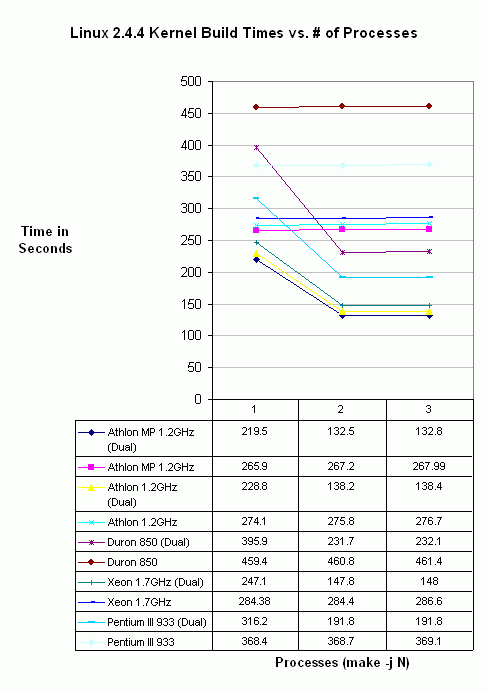AMD 760MP & Athlon MP - Dual Processor Heaven
by Anand Lal Shimpi on June 5, 2001 12:00 PM EST- Posted in
- CPUs
Linux Performance
The Linux market stands much to gain from the release of AMD's dual processor platform. Linux is a much more server-oriented operating system than Microsoft's Windows products and thus its applications often demand and benefit from having multiple processors. Take the Linux systems companies like Pogo, Penguin Computing and VA Linux, for example, who sell largely to the web serving market. Tyan's 760MP board appears designed specifically for this market, with slanted DIMM slots to allow it to fit within a 1 unit case. Given the simple-task, many-users nature of web serving, nearly perfect speed gains are possible with the increased parallel processing power. A rack of these machines would be impressive indeed.
While the extra CPU tends to benefit server tasks, desktop applications often see little or no performance improvement. For example, XFree86 (the low-level windowing server beneath your GUI) is single-threaded, as are most of the applications you would typically use. OpenGL acceleration can even suffer from reduced stability, as is the case with NVIDIA's drivers, which were used in our test beds, although we didn't stress these machines enough to find the limits.
To benchmark these systems, we evaluated using kernel compilation. Kernel compilation works well given its real-life nature and ability to stipulate the number of concurrent processes.
We used Linux 2.4.4 for compilation even though 2.4.5 was just released for the reason that it combines nicely with our previous article on the Xeon, which used the same test. We reran the Xeon tests anyway for consistency. Note that on 10 platforms, compiling with 3 different make parameters 3 times each means that we managed to compile 90 kernels! Kernels were compiled with default options -- run make menuconfig and quit or make config and hold return until you've exhausted the options. Kernels were compiled uncompressed.
Given that these scores are in seconds, the lower the value the better.
First, we can use this data to determine how much an architecture actually benefits from increased parallelism. The Athlons and Durons have a FSB with a point-to-point architecture, which yields more efficient usage of its 266MHz and 200MHz (respectively) DDR clock. The Xeon introduced a 400MHz quad-pumped FSB, a large improvement over the comparatively cramped 133MHz Pentium III FSB. Despite these differences, almost every platform showed similar improvements between 1 and 2 process SMP builds, with 2 process builds taking roughly 60% of the time 1 process builds took. Thus, the kernel compilation benchmark does not stress the FSB enough for one architecture to prove better than the others.
Second, we can easily see that clock rate can be deceiving, as the 1.2GHz Athlon MPs outperformed the Xeon. The Athlon MP finished the 2-process SMP build in better than 90% the Xeon's time. Further, the new Athlon MP core bested its previous generation by 4% in the same benchmark.
Third, the difference in 1-process builds between SMP and non-SMP architectures is very interesting. Note that every architecture improved when running with SMP enabled, meaning that despite serial compiling, there was still room for improvement. We particularly like this stat because it means one benefits from SMP without even running multithreaded / multi-process applications. Perhaps an odd and unimportant thing to notice, the Athlon and Athlon MP showed better improvements between 1 process non-SMP and 1-process SMP builds, with the SMP build taking 82% the time the non-SMP test took. For comparison, the Xeon's SMP build was 87% as long as its non-SMP build. We can't think of a reason for this, but it's interesting anyway.
Finally, note that increasing the number of processes to more than the number of available CPUs actually degrades performance. Our only explanation is that in battling for CPU time, instruction, memory and filesystem cache hits become less common.











0 Comments
View All Comments